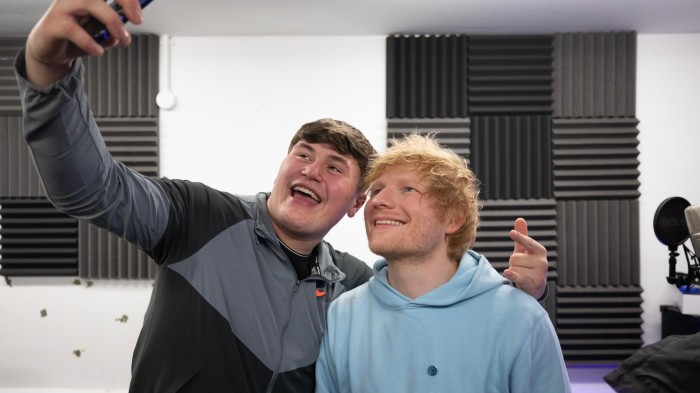Summarize this content to 2000 words in 6 paragraphs in Arabic A group of pupils at Coventry AP Academy, a school in the English Midlands, have been told that a pop star is visiting, but they don’t know who. Six teenagers, four boys and two girls, are sprawled on a sofa and sitting at chairs in the small soundproofed music room when the door opens and one of the world’s most famous musicians enters. “It’s Ed Sheeran!” a boy cries, leaping to his feet, astonished.Sheeran, 33, in light-blue hoodie, dark trousers and trainers with pink laces, returns their excited greetings. He places himself at the end of the sofa next to a grinning girl who hugs a cushion close to her in a pinch-me-am-I-dreaming way. First to perform is Jamie, 16. He stands with a microphone and raps a song he has written, an apology to his mother for causing trouble. “No matter what I do, you’ll always be true,” he volleys fluently into the mike.“Great flow,” Sheeran compliments him. Jamie, delighted, flush with pride, replies: “I know.” He tells the star he was singing one of Sheeran’s songs in the car on the way to school that morning. “Before you go,” he says, “I need a picture to show my mum.” Sheeran cheerfully accedes. It’s one of numerous selfies, group photos and video messages that he will pose for during his two-day whistle-stop tour of schools and youth music schemes across Britain. The occasion is the official launch earlier this month of the Ed Sheeran Foundation, a charity he has set up to boost music education in state schools and improve access to the music industry. The itinerary begins in Cardiff, before the 120-mile drive to Coventry. The following day will be spent in Edinburgh in the morning and Belfast in the afternoon. The foundation’s genesis came several years ago when Sheeran had a cup of tea with his old music teacher, Richard Hanley. Sheeran, the most famous alumnus of Thomas Mills High School in Framlingham, Suffolk, was shocked to discover how little was being spent annually on music. “Maths, science and English were getting 30 grand, and I was like: ‘Why is music getting 700 quid?’” he tells me when I join him in Coventry.In 2019, he founded a charity to address the situation. The initial beneficiary was his former school, a state secondary in a small market town in the east of England. Sheeran left it aged 16 in 2007 in order to roll the dice as a singer-songwriter, trekking the length and breadth of the UK gigging and busking.“There were teachers encouraging me to do a safe set of A-levels, go to a safe university, do a safe degree and essentially do something I didn’t want to for the rest of my life — because music wasn’t a ‘real’ job,” he says. “But my dad was like, ‘If you do what you love, it doesn’t matter how much you get paid for it, as long as you can make some sort of living from it.’ So leaving early from school was essentially me doing my apprenticeship.”Thomas Mills High School now has a recording studio and 30 Apple Mac computers with the music production software Logic, thanks to Sheeran. His first charitable foundation also donated to other schools, but the set-up was amateur. “Up until now, it was my old music teacher and someone that I worked with at the studio,” he says. “We’d take applications, and we’d sift through them and send out grants.” The thing I find most baffling is that the arts are one of our main exports, the thing we’re proudest of as a nation’The Ed Sheeran Foundation is the scaled-up successor to the earlier venture. The singer’s tour of the UK is a fact-finding mission with his team. Alongside the selfies, he spends a lot of time while I am with him in Coventry being briefed in rooms furnished with breeze-blocks, whiteboards and inspiring slogans pinned on walls (“Children are not an interruption to your day, they are the reason for it”). The decor — functional, institutional, inexpensive — illustrates that British state schools, which educate about 93 per cent of the country’s children, do a lot with comparatively little. Spending cuts and inflation have brought acute budgetary pressures. Music provision is suffering.A 2022 survey of music teachers by the Independent Society of Musicians reported mean yearly budgets of about £2,000 for music departments in state schools, compared with almost £10,000 in private schools. Last academic year, there was an annual rise of almost 9 per cent in students at all schools doing the subject at GCSE level, the academic qualification taken by 15-16-year-olds. But the long-term trend is downwards, with a 30 per cent fall in numbers between 2014 and 2023. More than 40 per cent of state schools don’t enter a single pupil for music GCSE, according to campaigning group the Cultural Learning Alliance. “The thing that I find most baffling is that the arts are one of our main exports and the thing we’re proudest of as a nation,” Sheeran says. “No one’s talking about our arms deals or our bankers in a positive sense. But everyone’s talking about the artists we produce, our musicians and songwriters and producers. I don’t know where the government thinks the next generation is going to come from.”He is speaking, between bites of a teatime pickled egg, in the back of a car as we head across Coventry in the winter darkness to another school. Even for a touring musician, Sheeran’s schedule is packed. He gets briefed multiple times and does several question-and-answer sessions during his afternoon in the city. He repeats the same advice to tyro musicians — “Don’t be afraid of failure”, “Treat songwriting like it’s a diary” — with unflagging engagement. The odd F-bomb is dropped, in contravention of school rules. (“And he swears!” a girl says amid laughter in the music studio where Jamie does his rapping.)“Honestly, I feel mad energised,” Sheeran tells me. “It’s so different than doing a press run. You feel like you’re doing something.”I was lucky to have a music teacher who encouraged me . . . He didn’t necessarily understand what I was doing, but he encouraged it. I think we’re losing that’Next stop is Barr’s Hill School, where Sheeran meets music teachers from across Coventry. He leans against an upright piano in the music room, fists thrust into the pockets of his hoodie, asking them about the challenges they face. Then eight pupils from Barr’s Hill file into the room, dressed in the jackets and ties of their school uniform, agog to find themselves in the presence of a megastar. They quiz him about his initial ambitions (“My goal wasn’t to be a well-known musician, I just wanted to sing a lot and get better”) and his worst worries when starting out (“Fear of failure”). The dignitary is ceremonially presented with a bottle of ketchup with the school’s name on its label. “This is going to get used,” Sheeran says, holding it up. Then we go upstairs to a large octagonal performance space. It’s filled by a huge big band made up of scores of musicians and singers from five Coventry schools, convened under a publicly funded programme called SoundLab-Cov. They play a song written by one of the singers, a rumbling rock number with a hint of Velvet Underground to it. Afterwards, Sheeran plugs in his acoustic guitar and sings his 2017 hit “Perfect” to whoops and applause.The song is a tender doo-wop ballad about his wife Cherry Seaborn, whom he met at school. That was also when he began songwriting. “I was lucky enough to have a music teacher who encouraged me,” he says of Richard Hanley. “He’s a classically trained music teacher, plays the trumpet, very much puts the orchestra together. He didn’t necessarily understand what I was doing, but he encouraged it. And I think we’re losing that.”With Sheeran as its sole funder, the Ed Sheeran Foundation aims to help financially: the schools and organisations he visits during his two-day UK tour receive donations. But Sheeran’s sights are set higher than one-off gifts or grants. The foundation is working to link up businesses, local councils and central government. Sheeran wants young people to be made aware of the wide range of jobs in the UK music industry, whose workforce numbered 216,000 in 2023. He reckons that music teaching needs to be shaken up. The GCSE syllabus is dominated by music theory and classical instruments. The kind of music we have heard in Coventry — rap, drum and bass, rock — is under-represented. “This isn’t me saying people shouldn’t be playing clarinet,” Sheeran insists. “I actually think classical music is hugely important. Because we do produce amazing classical composers, amazing classical musicians, film and TV composers: that’s the sector my brother works in.” (His older sibling Matthew is a classically trained soundtrack composer.) “But there needs to be a balance. There’s nothing in the school curriculum that caters for people like me.”The UK’s new Labour government has promised to improve arts education, with an emphasis on working-class participation. A national curriculum review is currently under way, and is due to publish recommendations this year.“I would love to be involved,” Sheeran says. “What I don’t want is just a lot of nodding, smiling promises and then nothing to happen. Because that happens a lot. For me, personally, this is something that I believe in and it’s something that I feel I can have some form of an influence to help change. So I’m going to do it.”His final destination in Coventry is The Tin Music and Arts, a venue that works with Coventry Music Service, which administers the city’s youth music budget (the total comes to almost £10 per school-age child each year: less than the price of an album). After another question-and-answer session, during which we learn that the trainers with the pink laces were given to him when he did a music video with US rap star Travis Scott — a thrill runs through the room at the mention of his name — Sheeran takes to the stage to play “Perfect” once again. During the song, he spots a 13-year-old girl singing along at the side of the stage and invites her to join him. She stands at a microphone stand, harmonising with him quite superbly. Her foster carer is moved to tears as she exits the stage. The girl is autistic. When she joined her foster family aged six, she was non-verbal. Music taught her how to speak — specifically Sheeran’s songs, which she discovered on Spotify and became obsessed by. She would sing snatches of them to her foster carers as a way of communicating with them.Afterwards, Sheeran learns about the history of his duet partner. This time, he is the one to be astonished. “It just makes you feel great,” he says as he gets back into the car, off for the next leg of his mission. edsheeranfoundation.comFind out about our latest stories first — follow FT Weekend on Instagram and X, and sign up to receive the FT Weekend newsletter every Saturday morning
رائح الآن
rewrite this title in Arabic Why Ed Sheeran went back to school
مال واعمال
مواضيع رائجة
النشرة البريدية
اشترك للحصول على اخر الأخبار لحظة بلحظة الى بريدك الإلكتروني.
© 2026 جلوب تايم لاين. جميع الحقوق محفوظة.









